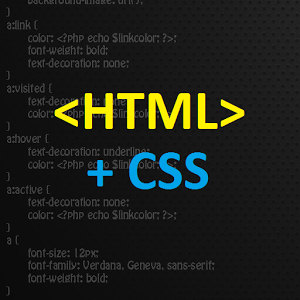 One of the things I have been working to learn in my copious spare time is web design. No, I’m not yet attempting to build pages (although if you are just starting out and don’t have the $$ for a top-tier professional, comment here and I will email you and see if we can work something out). The point is, I have been working on learning the intricacies of WordPress, but felt I needed to brush up on my HTML/CSS coding in order to follow along with the WP course pace, as the instructor flies through the HTML/CSS coding very quickly.
One of the things I have been working to learn in my copious spare time is web design. No, I’m not yet attempting to build pages (although if you are just starting out and don’t have the $$ for a top-tier professional, comment here and I will email you and see if we can work something out). The point is, I have been working on learning the intricacies of WordPress, but felt I needed to brush up on my HTML/CSS coding in order to follow along with the WP course pace, as the instructor flies through the HTML/CSS coding very quickly.
How is this relevant to this post (and writing)? Well, the HTML/CSS course, offered by the same instructor (who I like very much and is quite knowledgeable), is 9-hours and costs $29. I thought that an extremely fair price as anyone who’s taken a technical course with their company and/or from a “well-known” instructional institute, knows a one-day course normally runs in the neighborhood of $500 or more.
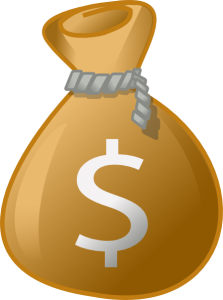 Here’s the rub: as I paid for the course, my mind was wandering a bit as I filled in the boring sign-up data and I started thinking “How does this 9-hour course at $29 compare, relatively, to the price of my books in the marketplace?” The main reason I wondered this is because I had no issue at all paying $29 for a course whose instructor I already knew, had experienced positively, and would deliver that for which I was looking.
Here’s the rub: as I paid for the course, my mind was wandering a bit as I filled in the boring sign-up data and I started thinking “How does this 9-hour course at $29 compare, relatively, to the price of my books in the marketplace?” The main reason I wondered this is because I had no issue at all paying $29 for a course whose instructor I already knew, had experienced positively, and would deliver that for which I was looking.
Imagine my dismay when my mind went from “wandering mode” to “focused mode” and I realized that this one-day course (approximately) was nearly TEN TIMES the cost of one of my entire novels. What was upsetting me, however. may not be what you expect. I still wasn’t put of at all by the price of the course. Nor, actually, was I terribly put off by the price differential, per se. Novels and technical training are, after all, at best “apples and oranges” and probably more like “apricots and Buicks”.
 What hit me like a freight train on a dark track in the middle of a lightless tunnel was the magnitude of complaining I hear about the cost of eBooks while the world’s consumers go right on paying “normal” prices for most of their other goods. As if to punctuate this thought, it was not an hour later when one of my web posts received the below comment in regard to my third James Pruett Mystery, Honor Land (I determined NOT to post the comment for two reasons, which I will discuss in a moment)—here is the comment:
What hit me like a freight train on a dark track in the middle of a lightless tunnel was the magnitude of complaining I hear about the cost of eBooks while the world’s consumers go right on paying “normal” prices for most of their other goods. As if to punctuate this thought, it was not an hour later when one of my web posts received the below comment in regard to my third James Pruett Mystery, Honor Land (I determined NOT to post the comment for two reasons, which I will discuss in a moment)—here is the comment:
“Enjoyed first book. Just reying to get free copy next anazon want 4.99”
The reasons I did not approve the comment were these:
1) I planned on giving the comment, or at least the logic behind it, its due response (in this blog)
and
2) I didn’t want to embarrass the commenter by showing the world his/her inability to write two sentences without butchering the English language.
I’m sure by now you have either reached, or are very close to reaching, the reason for my frustration at this comment (sans grammar issues). It represents a quite prevailing wind of opinion about eBooks that has been swirling around the marketplace since the early days (2010-2011) when John Locke and Amanda Hocking (and a few others) permanently mortared our prized product—books—by devaluing them to 99 cents to make millions on volume sales then disappear into the night.
(Yes, I realize to blame the entire market shift on two authors is a bit hyperbolic, but every scandal must have its scapegoats.)
Why is it that a course on HTML/CSS, or a cup of coffee at one’s favorite latte shack, or an $800 iPhone, or a $55,000 Chevy, barely raise an eyebrow, but a novel—which not long ago cost over $20 in hardback and $12-15 in paperback—are suddenly entirely overpriced (in many readers’ minds) at $2.99-4.99? That’s three to five BUCKS! For a novel that took the writer months to construct and likely provided the consumer with at least a week (or even weekend) of pleasure.
Let me put it another way: how many four-dollar lattes does the average reader drink over the course of enjoying a novel?
Now please, don’t misunderstand: I am not implying that ALL (or even MOST) readers are oblivious to the value of a good book. However, ask yourself, honestly, where’s your price-line, even for an author you’ve already discovered and love? It’s just you, so be honest. $3? $4?
I receive a handful of emails a day from readers who LOVE the Sheriff Pruett series. LOVE. IT. All want to know only one thing:
When’s the next one out?
But I seriously wonder if I raised the price on my books to $7.99 or $9.99, like any well-known writer, if my fans would pay it. I can almost guarantee at least some wouldn’t. Not because they are bad people; it’s because of the Locke-Hocking Price-Conditioning Pandemic.
Yep, I’ve officially given it a name and therefore a place in history.
 The Great Locke-Hocking Price-Conditioning Pandemic.
The Great Locke-Hocking Price-Conditioning Pandemic.
If I go out to buy a new pickup truck that my mind tells me, because of the ads I’ve seen; people with whom I’ve discussed the purchase; sites I’ve visited and seen comparable pricing, should cost me somewhere around $30,000, and the salesman starts off at $70,000—I’M GONE. It’s not that I’m a bad person, or that I want to ruin the poor salesman’s day, but I am conditioned to know what the expected (i.e. material) cost of the item should be.
The GLHPCP has (hopefully not permanently) altered normal consumer/readers’ perceptions of value-to-product for eBooks. It’s not the fault of the consumer/readers. They are not mean-spirited—the readers who write me are some of the kindest, most supportive (and thankful) people I’ve encountered in Cyberspace. But I would bet my left, uh, eyebrow that were I to raise my book price to $7.99, the next book—the one for which they are salivating—few (if any) would buy it.
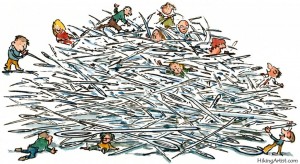 Now I sympathize with the reader, who is now (unfairly) faced with what I call “finding a needle in a stack of needles”. There is so much CRAP out there, and the consumer/reader is now tasked with sifting through it (a good friend just read an Indie book that, when it came to the pinnacle of the story—a proposal—the man fell to one knee and romantically asked “Will you many me?”
Now I sympathize with the reader, who is now (unfairly) faced with what I call “finding a needle in a stack of needles”. There is so much CRAP out there, and the consumer/reader is now tasked with sifting through it (a good friend just read an Indie book that, when it came to the pinnacle of the story—a proposal—the man fell to one knee and romantically asked “Will you many me?”
But THIS is why unknown authors run promos, and give away their books for free (or for 99 cents—same as a comb in the Dollar Store): so that the reader can sample their wares without risk. Not because a book is worth NOTHING.
I’ll admit, it’s really frustrating. I try to find another market—morning lattes; pocket and tablet electronics; bagel stores—anywhere where the prices have been forced to drop to a few dollars (or in the case of lattes or a dozen bagels, a few cents).
There are none. Prices are going up, yet the Starbucks near my house has a line of cars at the drive-thru that wraps around the building from 5AM to noon. There’s so much new construction of housing “Starting in the low $400,00’s” that the roads are literally packed with every manner of construction vehicle. 75% of the cars on the road with me, if not new, are no more than a year or two old.
But a book?
50-150,000 words of wonderful story.
Months of the author’s blood, sweat, tears, and fingertip calluses.
Hours and hours of entertainment.
Three bucks? Four?
Outrageous.
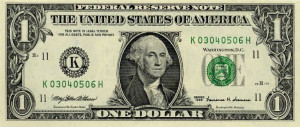 99 cents or FREE. That is what many readers expect. Probably in many cases, subconsciously, but try to sell an eBook for more than a few dollars and you’ll soon discover that the bar is set abnormally low in the literature marketplace.
99 cents or FREE. That is what many readers expect. Probably in many cases, subconsciously, but try to sell an eBook for more than a few dollars and you’ll soon discover that the bar is set abnormally low in the literature marketplace.
Do I have an answer? Not really. I won’t insult the readers for simply viewing the marketplace. I suppose the only antidote that has any chance of working is time. Perhaps, over time, readers will again realize what books really mean to them—and to society as a whole.
It has gotten better. I remember literally begging authors not to permanently price all their books at 99 cents (even though many of them were overpriced even at that number). “Use it as a promotion, yes, but otherwise you are devaluing not just the marketplace, but our profession.”
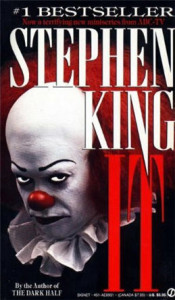 When I was 14, 15, and 16, I used to devour Stephen King (not literally—his writing). This was, for perspective, in the eighties. Thirty plus years ago. Even setting inflation aside, I used to wait, impatiently, for the new King book (and for those who remember how it worked then, most authors wrote a book a year, and it always came out first in hardback and then, maybe six months to a year later, paperback). But if you loved an author, you had to have the hardback, as soon as it came out.
When I was 14, 15, and 16, I used to devour Stephen King (not literally—his writing). This was, for perspective, in the eighties. Thirty plus years ago. Even setting inflation aside, I used to wait, impatiently, for the new King book (and for those who remember how it worked then, most authors wrote a book a year, and it always came out first in hardback and then, maybe six months to a year later, paperback). But if you loved an author, you had to have the hardback, as soon as it came out.
I remember the pure elation at seeing that “new book display” at the front of (Waldenbooks, Barnes & Noble, Borders—which I don’t think actually existed yet). A 14-year-old kid slapping down his TWENTY-SOME BUCKS. I wasn’t rich. My parents were teachers, with a family of five.
I sacked groceries.
And I never missed a new King release (among other authors: Terry Brooks, John Grisham, Dean Koontz).
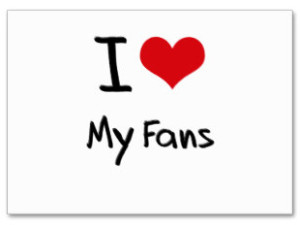 I DO know there are a lot of readers out there who already know (and agree) with everything I’ve said. And if I could afford to put you all on a private jet for the Bahamas or Hawaii to celebrate my appreciation for you, I would. Swear to God.
I DO know there are a lot of readers out there who already know (and agree) with everything I’ve said. And if I could afford to put you all on a private jet for the Bahamas or Hawaii to celebrate my appreciation for you, I would. Swear to God.
And those positive emails you send? The ones like this:
“I never write authors, give stars or say anything kind–but you are the exception. I LOVE your books. Raised in Casper, Laramie for undergrad then returned to teach a few years in Lander and Laramie–I love my ex-state. You are the only author to get Wyoming right–culture and atmosphere and location.
Please write lots more Wyoming.”
Please keep them coming. I always respond and say how much the love keeps we writers going and that readers are the lifeblood. You are. And you are far more than appreciated—you are everything.
The economics of it all? As with everything, I’m sure one day equalization will happen.
~~~~~~~~~~~~~~~~~~~~~~~~~~~~~~~~~~
The blank page is dead…long live the blank page.
~~~~~~~~~~~~~~~~~~~~~~~~~~~~~~~~~~



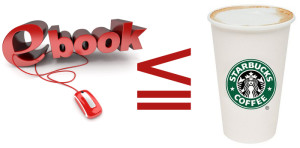
I haven’t been by your blog in some time (exhaustion mostly) but now I remember why I always enjoyed it.
To this post I say: Yes. Yes! YES!!
I have said all the things you’ve said. I have exhorted authors not to price their books permanently at 99c or (the horror) permafree. I will run temporary promotions, but not, as you say, permanently, because it devalues the work. The only place I give a book away free all the time is to subscribers to my newsletter – and really I am paid with their email address and marketing opportunities.
The devaluing of books leaves me numb and frustrated and also angry. This is what happens when too many self-interested people act solely in their own interests without thought for how it affects their industry as a whole, and so also, ultimately, how it will negatively affect them in the long-term. Short-term gain for long-term pain is a bad choice. But authors see no other way and so all they do is continue to apply downward pressure to book prices.
This herd mentality of just doing what everyone else does because it works, without consideration for WHY it worked (such as because it was novel) or if it will continue to work if everyone does it (generally, no….) is incredibly damaging.
CIARA! Wow, I’ve missed you! And no worries on not visiting my blog in a while because (of EXHAUSTION) I have not posted in quite a while!
Well, you know everything I am going to say would be simply to agree and trump back over your agree. 🙂
I was telling someone the other day, at my level of sales, if I were being paid even what well-known authors are making now, but most definitely what these books are truly WORTH, I would be able to write without worrying about income. But the lower the prices are driven, it gets to the point where a writer wants to throw up the hands and say “enough is enough; I don’t write for free, just as no one goes to a 9-5 job without being paid. Can you imagine? “Thanks for your 40 hours, but we’ve decided to make your work FREE, so you won’t be getting paid this week!”
Thanks for popping back over and for the comment—lucid and erudite as ever. 🙂
Hooray! I’m so glad that I still don’t fly alone on this one Rob. A colleague of mine was banging on the other day about how she was able to fill up her shiny new ereader with dirt cheap titles and – inevitably – my hackles went up.
I actually confronted her about it. Asked her if she had any idea how much effort goes in to crafting a book. How much time and stress and self doubt is invested by a writer… “& the best you can do is demand it for less than a buck or worse – FOR FREE??”
The conversation ended there. A little while later that she told me she let the battery on her ereader run flat and doesn’t use it anymore. Then told me all about the great deal she got on a pair of Jimmy Choos.
:/
Ah, Dean. Jimmy Choo. A sure necessity, extra pairs of Choo shoes—after all, we only write books. : /
The funny thing is, well, there really isn’t anything funny about it. 🙂 Time is the great healer. Hopefully it will also be so for our marketplace.
Good to hear from you, my friend. Hope all is fine down under (everything is always good down there, isn’t it?). 🙂
Most of the time, everything is good. Australians tend not to realize just how good they’ve got it though.
Great points, Rob. One of the big factors at play here has nothing to do with books. It has to do with the value consumers place in their minds on electronic content – whether it’s a web page on the newyorktimes.com or an mp3. Most internet content is free (and that’s a great thing) so people don’t want to pay for any bits of data that come across it.
In contrast, when you hold a one-pound copy of Stephen King, you feel the value. You place it on a shelf with your other prized books.
An ebook just sits as a file on your device. There is nothing really “there.” Streaming from the cloud just exacerbates the fact that you don’t actually own anything. So why pay for it? This causes a mental shift in what a person is willing to pay. The 0.99 price you hate is what people are willing to pay for anything electronic — such a song or an app, which are both creative products that may have taken the developer a long time to produce, and which could bring immense value to the buyer.
The consumer isn’t saying “This book has no value”, they are saying “I don’t really own anything.” That’s a really important distinction.
This issue is mainly about electronic content. Not only is electronic content cheap to produce and distribute (and hence should be near free in the consumer’s mind), but it’s also easy for anyone to deploy (so the consumer really doesn’t see the true work that went into it.) It’s not fair to single out a few authors who figured out how to succeed within this harsh new reality. They would not have succeeded had they priced their ebooks at $20. No one would have.
Still, a thought-provoking piece.
Hi, Greg.
I think we’re talking about two different price point aspects of digital books. I did smear the line a bit when comparing the hardcover books I used to buy, but I never made a contention that digital content should ever be as much as printed; only that even as a child I was willing to pay over $20 to read an author I enjoyed. Even a print copy of one of my books is twice the price of its digital counterparts and the hardcover cost of a Stephen King book (new release, at least) is still in the $20-$25 range.
You mentioned digital streaming content and, more importantly (because it is one of the comparisons I’ve used before when discussing the specific devaluation of eBooks), is the price of a digital song (which has risen, for new content, to $1.29, but that’s splitting hairs). The digital song, a rickety comparison I believe, is, yes, around a dollar. But the album still ranges from $9.99 to $12.99. Not all that much less than what a cassette used to cost me—more, actually. But a digital copy of a 300 page novel? Hardly comparable to a single 3-5 minute song, I’m certain you would agree, and much closer to the artist’s full effort in the 10-15 song album. A full book (not a chapter or a short story or even a novella) has still been driven down (devalued) below all other similar digital content.
I don’t argue in the least that consumers and the marketplace should value digital content lower than it’s “weighty” counterpart. For one thing, there are far fewer overhead costs (paper, printing presses, labor, brick and mortar stores to carry and sell the stock, etc.).
But take streaming digital content: to watch a digital movie, in high definition, streaming, for just 24-48 hours (i.e. not to own it), runs between $3.99 and $5.99 for most current releases (setting aside, for the moment, subscription options which candrop the digital price point for a viewing a bit lower—but on average raises it because we humans become so must we let the $15.99 or even $7.99 monthly subscriber rate slip by one, two, even five or six months, without watching a single movie).
And to OWN the movie (which is what we are talking about with eBooks, digital songs and albums), in digital format (again no weighty object in which to intrinsically “feel” the worth, approximately $10.99 or so.
I also do agree that there is a perception with which to be contended (that much digital content is free, so “why should I pay for it?”), but the NY Times, Esquire, Sports Illustrated—and all the other upper echelon publications (and even mid-to-lower echelon ones—charge a subscription rate for their full digital content (and again, the prices are relatively much higher than books).
I still stand strong on my contention that eBooks were devalued inappropriately and in concert, readers expectations—toward eBooks alone. The reader expectations are (i believe) getting better, but a majority are still unreasonably valued, compared to the digital content of comparable art, entertainment, news, and musical media.
I sincerely thank you for the comment Greg. Again, I don’t disagree with many of your contentions regarding digital vs. print. But compare digital book prices with digital albums, owning a digital movie, and purchasing a digital subscription to the NY Times (or whatever paper or magazine), and I think you will see a disparity in price point that is both unwarranted and—at least in part—created by the “99-cent Revolution” and the glut of “authors” offering their books permanently at 99 cents or free (for other than promotional, marketing logistics).
Haven’t been on in a while but what a great post.
Yeah, I honestly don’t get the logic.
I don’t think folks realize how long it takes to write a novel.
All that time sitting in a chair bleeding out words, getting stuck and wanting to pound your head against a wall because you have no way of knowing if anyone is going to buy it.
Starbucks coffee is so damn expensive, and yet people line up for that daily.
Now with Kindle Unlimited on the scene they can get their fix for $9.99 a month and we can get our pennies 😉
Maybe I will get enough pennies this month to buy myself one of those expensive lattes.